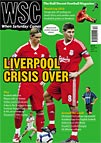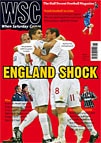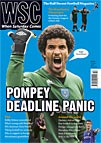 Dear WSC
Dear WSC
I read with interest Paul Joyce’s article concerning the rebranding of SSV Markranstadt as RB Leipzig in WSC 273. Only this summer it was rumoured that my club Southampton would be saved from extinction by becoming co-opted into the Red Bull sporting portfolio. While the team colours, fitting snugly with the brand, would not need to change the adding of the Red Bull moniker seemed a step too far. Surely something would be lost in fusing a global brand, with all its focus-grouped values and marketing spin, to a football club; an act of historic vandalism similar to replacing stained glass windows in a church with double glazing while nailing a satellite dish to the spire. The internet debate suggested, however, that many Saints supporters were happy to trade naming rights in exchange for the club’s survival. The same supporters had several years previously reacted angrily against a corporate branding of St Mary’s Stadium as simply the “Friends Provident Stadium” with the ensuing negative publicity resulting in a U-turn with the addition of St Mary’s to the title. Corporate patronage is not as new as we would like to imagine. The P in PSV Eindhoven stands for Philips, as in the Dutch electrical giants, with the club’s home games at the Philips Stadion. Indeed, many clubs have benefited from long-term relationships with business which may be far preferable to other ownership and financing options; a quick glance around the leagues reveals several fates far worse than “Red Bull Saints”. Football may be just a game to some but following our team is about being part of a community, feeling a connection with the friends and strangers stood next to us at the ground. It is a thread linking us to people looking out for the score on a TV screen or in a newspaper on the other side of the world. Brands by their nature seek to harness and transform these feelings to translate them into profit, in the process sullying the very spirit of our club. Barcelona’s motto is “more than a club”. Every clubs motto should be “more than a brand”.
Neil Cotton, Southampton
Search: 'Paul Ince'
Stories
 Dear WSC
Dear WSC
In WSC 272 Jonathan O’Brien finds it remarkable that Celtic’s Bertie Auld “straightfacedly asserts that beating Dunfermline in the Scottish Cup final in 1965 was more important than the title win a year later”. But Auld is not alone in his assertion. No less a man than Jock Stein said in the Dunfermline history Black and White Magic: “It wouldn’t have gone as well for Celtic had they not won this game.” The Celtic history The Glory and the Dream also notes: “The largest framed photograph in [Stein’s] office at Celtic Park showed Billy McNeill borne aloft at the end of the match.”Celtic had won nothing since “the 7-1 game”, a freakish League Cup final triumph over Rangers in 1957. So this win, Stein’s first trophy seven weeks after officially becoming manager, stopped a rot which was threatening to turn Celtic into also-rans in Scotland. Without it the Lisbon Lions may never have been and there may only ever have been one “nine-in-a-row” in Scottish football. And that would never do.
Mark Murphy, Chessington
 Numbers matter to the supporters of Brazil's biggest club sides but the figures don't always add up. Robert Shaw reports
Numbers matter to the supporters of Brazil's biggest club sides but the figures don't always add up. Robert Shaw reports
Flamengo are seen by many as Brazil’s Manchester United – at least when it comes to support, if not titles. Size matters to their fans who proclaim themselves the biggest such group in the world (Maior do Mundo) by draping a large banner to that effect at all Flamengo games in the Maracanã. In a country where the away support for Serie A clubs hardly goes beyond a couple of coach-loads Flamengo routinely manage to compete with, if not outnumber, the home turn-out.
 Having acquired sporting representatives in Austria and the US, Red Bull have turned to Germany. Paul Joyce assesses the fallout
Having acquired sporting representatives in Austria and the US, Red Bull have turned to Germany. Paul Joyce assesses the fallout
No city exemplifies the decline of East German football since reunification more starkly than Leipzig. Lokomotive Leipzig, European Cup-Winners Cup finalists in 1987, went bankrupt in 2004 and had to restart at the bottom of the league pyramid. They now play in the same fifth division as former GDR champions Sachsen Leipzig, who entered insolvency in March with debts of €3 million (£2.7m).
 Paul Joyce looks back at Lucerne's Nationalliga A triumph, their sole league title to date
Paul Joyce looks back at Lucerne's Nationalliga A triumph, their sole league title to date
The long-term significance
In 1987, the Nationalliga A was reduced from 16 to 12 clubs and the season was split into two parts. After a pre-Christmas “qualifying round”, points were halved and carried forward into a “final round” contested by the top eight clubs. As their budgets increased, Swiss clubs were able to attract young overseas talent and also ageing stars, such as Marco Tardelli, who looked forward to playing the “stress-free football” that Karl-Heinz Rummenigge was enjoying at Servette. By 1989, 46 per cent of players in the NLA were foreigners. These changes made the league harder to predict. Neuchâtel Xamax won their only two championships in 1987 and 1988, and FC Lucerne’s sole league title followed in 1989.